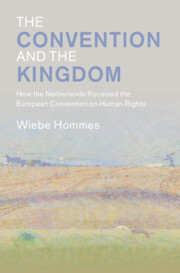Chapter 1 - 1945–1954
Constructing the Moral Basis for European Integration
Published online by Cambridge University Press: 08 August 2025
Summary
Chapter 1 begins its historical reconstruction of the Convention in the immediate post-war period and focuses on the peculiar connection it establishes between human rights and the concept of Europe. It runs from 1945 to 1954, the moment the Convention became legally binding in the Kingdom of the Netherlands.
First, the chapter shows the impact of non-governmental activists, in particular European Federalists, on how two distinct concepts, namely ‘Europe’ and ‘human rights’, became connected in a legal sense, instead of the more current moral or cultural meaning.
Second, it highlights how those involved in linking the concepts drew upon distinct conceptions of ‘Europeanness’. European human rights were distinctively not universal values. Instead, they were inspired by a very peculiar idea of what Europeanness entailed, and restrained by pervasive civilizational, colonial and racial considerations.
Third, the chapter shows how European human rights were drafted into law and how they were perceived by the Dutch government. It sheds light on what the government expected by signing up to the Convention in 1950 and makes clear how the ‘European’ character of these human rights fits with the notion that the Kingdom of the Netherlands was not solely a European country.
Keywords
Information
- Type
- Chapter
- Information
- The Convention and the KingdomHow the Netherlands Received the European Convention on Human Rights, pp. 21 - 65Publisher: Cambridge University PressPrint publication year: 2025
Accessibility standard: WCAG 2.0 A
Why this information is here
This section outlines the accessibility features of this content - including support for screen readers, full keyboard navigation and high-contrast display options. This may not be relevant for you.Accessibility Information
Content Navigation
Allows you to navigate directly to chapters, sections, or non‐text items through a linked table of contents, reducing the need for extensive scrolling.
Provides an interactive index, letting you go straight to where a term or subject appears in the text without manual searching.
Reading Order & Textual Equivalents
You will encounter all content (including footnotes, captions, etc.) in a clear, sequential flow, making it easier to follow with assistive tools like screen readers.
You get concise descriptions (for images, charts, or media clips), ensuring you do not miss crucial information when visual or audio elements are not accessible.
Structural and Technical Features
You gain clarity from ARIA (Accessible Rich Internet Applications) roles and attributes, as they help assistive technologies interpret how each part of the content functions.
